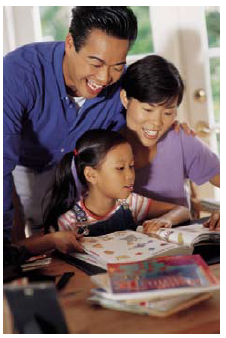Dual Language Learners (DLL) are children who learn two (or more) languages at the same time. They learn a second language (English) while continuing to develop their native (or home) language.
They also may be called:
- Bilingual
- Limited English Proficient
- English Language Learners
- Languages other than English
- English as a Second Language (ESL)
Although some DLL children arrived in the United States as school-aged children, the majority of DLLs (64 percent) were born in and spent their early years of life in the United States1.

Dual Language Learners in Nevada
Nevada is one of seven states with the fastest growing population of Dual Language Learners2. In the Clark County School District, 92,000 of 310,000 students in 2011 are English Language Learners3.
According to Clark Couty School District (CCSD) statistics in 2011, around 90 percent of these students speak Spanish and English. The 2009 Head Start Program Information Report stated that 57 percent of Head Start attendees in the region, including Nevada, are Dual Language Learners and 85 percent of those Dual Language Learners speak Spanish as their home language.
Achievement of DLL Students
School studies have shown that DLL students often4
- have difficulties in mastering English;
- fall behind in academic achievement;
- have higher school dropout rates.
However, these outcomes can be changed when young DLLs are exposed to diverse early literacy experiences (e.g., reading books, sharing nursery rhymes, taking children to the library, helping children learn about letters) either at home or in child care programs.
Literacy Benefits of Home Language
Although some school studies have shown difficulties for DLLs, many young DLLs have shown promising futures.
- DLL children who come to school with pre-reading experiences (in either their home language or English) tend to not have difficulties in reading5.
- Improving early literacy development in their home language relates to improving early literacy skills in English6.
- Young children’s early development of spoken vocabulary of their home language contributes to improved English reading comprehension in upper elementary grades7.
- Early literacy development among Spanish speakers is related to improved reading achievement in English in the third and fourth grades8.
What Parents Can Do
- Parents need to encourage their children’s use of home language. Many families with DLL children have a false belief that using the first language in the home might be a barrier to learning a second language (English), but this is not true. Encouraging children to learn their home language will help them later.
- Early family literacy experiences such as reading books with children in their home language (children’s books) and practicing rhyming in their first language help children learn to read before they go to school. Currently, most of the libraries in Clark County have a collection of children’s books in Spanish. University of Nevada Cooperative Extension (Clark County) provides the Spanish version of the Family Storyteller Program (Cuentos) which encourages parents to read Spanish children’s books with their children. Currently six weekly workshops are available upon request.
- Although it might seem that your children have smaller vocabularies in the short term, they end up building larger total vocabularies than children who only know one language.
- A young child has the potential to develop both languages. Learning two languages during the early years will not delay the child’s English language development.
- Make sure your child is exposed to both your home language and English as early as possible in a variety of contexts: preschool programs or child care programs (Head Start, state funded pre-k, title I pre-k or other community child care programs), cultural events, community gatherings, playgroups and family gatherings in each language. Parents also need to learn English to support their child to use and hear both languages. Las Vegas Library District offers ESL classes in several locations (LVCCL).


What Child Care Providers Can Do
- Child care providers need to understand that DLL preschoolers are learning two languages at the same time. Do not think that the child’s speech is delayed because the child is bilingual.
- If you cannot speak the child’s home language, take classes and learn from others how children communicate important needs and wants (e.g., hunger, hurts, sleep, potty, etc.). This will not only help meet the child’s needs, but respect the family’s home culture.
- Have more teachers (or assistant teachers/aides) who speak the children’s home language or invite parents, college students or other community volunteers who are bilingual to participate on a regular basis in your program. Young DLL children can benefit when child care programs build connections among children’s home language, literacy and culture.
- Play music and songs in the child’s home language regularly. Include the child’s home language on signs, labels and in books in the classroom.
- If you have a mixed classroom (some children speak English and others speak other languages), teach lessons in English but provide small group time to support children’s home language/ culture.
- Create an open and welcoming environment to families who use languages other than English. Show respect for their home languages and cultures.


Parents and child care providers need to make continuous efforts to support the use of both native language and English for DLL children. These children will be better prepared for school and future academic success.
References
1 Batalova, J. (2006). Foreign students and exchange visitors. Washington, DC: Migration Policy Institute. Retrieved from MPI.
2 Grantsmakers for Education (2011). Investing in our next generation: A funder’s guide to addressing the educational opportunities and challenges facing English Language Learners. Portland, OR.
3 Curtis, L. (2011, May 30). Schools helping students become bilingual, biliterate. The Las Vegas Review- Journal.
4 Gandara, P., Rumberger, R., & Maxwell- Jolly, J., & Callahan, R. (2003). English learners in California schools: Unequal resources, unequal outcomes, Educational Policy Analysis Archives.
5 Riches, C., & Genesee, F. (2007). Literacy: Crosslinguistic and crossmodal issues. In F. Genesee, K. J. Lindholm-Leary, W. Saunders, & D. Christian (Eds. ). Educating English language learners: A synthesis of research evidence (pp. 64- 108). New York: Cambridge University Press.
6 August, D., Carlo, M., Dressler, C., & Snow, C. (2005). The critical role of vocabulary development for English Language Learners. Learning Disabilities Research & Practice, 20(1), 50-57.
7 Proctor, C. P., August, D., Carlo, M. S., & Snow, C. (2006). The intriguing role of Spanish language vocabulary knowledge in predicting English reading comprehension. Journal of Educational Psychology, 98, 159-169.
8 Manis, F. R., Lindsey, K. A., & Bailey, C. E. (2004). Development of reading in grades K-2 in Spanish- Speaking English-Language learners. Learning Disabilities Research & Practice, 19, 214-224.
For more information, contact Yaebin Kim (702) 258-5521/ email


